标签:title field mfc ini vendor with standard log error
【温故而知新】类似文章浅析USB HID ReportDesc (HID报告描述符)
现在将en.stm32cubef1\STM32Cube_FW_F1_V1.4.0\Middlewares\ST\STM32_USB_Host_Library\Core\Inc\usbh_def.H

/** ****************************************************************************** * @file usbh_def.h * @author MCD Application Team * @version V3.2.2 * @date 07-July-2015 * @brief Definitions used in the USB host library ****************************************************************************** * @attention * * <h2><center>© COPYRIGHT 2015 STMicroelectronics</center></h2> * * Licensed under MCD-ST Liberty SW License Agreement V2, (the "License"); * You may not use this file except in compliance with the License. * You may obtain a copy of the License at: * * http://www.st.com/software_license_agreement_liberty_v2 * * Unless required by applicable law or agreed to in writing, software * distributed under the License is distributed on an "AS IS" BASIS, * WITHOUT WARRANTIES OR CONDITIONS OF ANY KIND, either express or implied. * See the License for the specific language governing permissions and * limitations under the License. * ****************************************************************************** */ /* Define to prevent recursive ----------------------------------------------*/ #ifndef USBH_DEF_H #define USBH_DEF_H #ifdef __cplusplus extern "C" { #endif /* Includes ------------------------------------------------------------------*/ #include "usbh_conf.h" /** @addtogroup USBH_LIB * @{ */ /** @addtogroup USBH_LIB_CORE * @{ */ /** @defgroup USBH_DEF * @brief This file is includes USB descriptors * @{ */ #ifndef NULL #define NULL 0 #endif #ifndef FALSE #define FALSE 0 #endif #ifndef TRUE #define TRUE 1 #endif #define ValBit(VAR,POS) (VAR & (1 << POS)) #define SetBit(VAR,POS) (VAR |= (1 << POS)) #define ClrBit(VAR,POS) (VAR &= ((1 << POS)^255)) #define LE16(addr) (((uint16_t)(*((uint8_t *)(addr)))) + (((uint16_t)(*(((uint8_t *)(addr)) + 1))) << 8)) #define LE16S(addr) (uint16_t)(LE16((addr))) #define LE32(addr) ((((uint32_t)(*(((uint8_t *)(addr)) + 0))) + \ (((uint32_t)(*(((uint8_t *)(addr)) + 1))) << 8) + (((uint32_t)(*(((uint8_t *)(addr)) + 2))) << 16) + (((uint32_t)(*(((uint8_t *)(addr)) + 3))) << 24))) #define LE64(addr) ((((uint64_t)(*(((uint8_t *)(addr)) + 0))) + \ (((uint64_t)(*(((uint8_t *)(addr)) + 1))) << 8) + (((uint64_t)(*(((uint8_t *)(addr)) + 2))) << 16) + (((uint64_t)(*(((uint8_t *)(addr)) + 3))) << 24) + (((uint64_t)(*(((uint8_t *)(addr)) + 4))) << 32) + (((uint64_t)(*(((uint8_t *)(addr)) + 5))) << 40) + (((uint64_t)(*(((uint8_t *)(addr)) + 6))) << 48) + (((uint64_t)(*(((uint8_t *)(addr)) + 7))) << 56))) #define LE24(addr) ((((uint32_t)(*(((uint8_t *)(addr)) + 0))) + \ (((uint32_t)(*(((uint8_t *)(addr)) + 1))) << 8) + (((uint32_t)(*(((uint8_t *)(addr)) + 2))) << 16))) #define LE32S(addr) (int32_t)(LE32((addr))) #define USB_LEN_DESC_HDR 0x02 #define USB_LEN_DEV_DESC 0x12 #define USB_LEN_CFG_DESC 0x09 #define USB_LEN_IF_DESC 0x09 #define USB_LEN_EP_DESC 0x07 #define USB_LEN_OTG_DESC 0x03 #define USB_LEN_SETUP_PKT 0x08 /* bmRequestType :D7 Data Phase Transfer Direction */ #define USB_REQ_DIR_MASK 0x80 #define USB_H2D 0x00 #define USB_D2H 0x80 /* bmRequestType D6..5 Type */ #define USB_REQ_TYPE_STANDARD 0x00 #define USB_REQ_TYPE_CLASS 0x20 #define USB_REQ_TYPE_VENDOR 0x40 #define USB_REQ_TYPE_RESERVED 0x60 /* bmRequestType D4..0 Recipient */ #define USB_REQ_RECIPIENT_DEVICE 0x00 #define USB_REQ_RECIPIENT_INTERFACE 0x01 #define USB_REQ_RECIPIENT_ENDPOINT 0x02 #define USB_REQ_RECIPIENT_OTHER 0x03 /* Table 9-4. Standard Request Codes */ /* bRequest , Value */ #define USB_REQ_GET_STATUS 0x00 #define USB_REQ_CLEAR_FEATURE 0x01 #define USB_REQ_SET_FEATURE 0x03 #define USB_REQ_SET_ADDRESS 0x05 #define USB_REQ_GET_DESCRIPTOR 0x06 #define USB_REQ_SET_DESCRIPTOR 0x07 #define USB_REQ_GET_CONFIGURATION 0x08 #define USB_REQ_SET_CONFIGURATION 0x09 #define USB_REQ_GET_INTERFACE 0x0A #define USB_REQ_SET_INTERFACE 0x0B #define USB_REQ_SYNCH_FRAME 0x0C /* Table 9-5. Descriptor Types of USB Specifications */ #define USB_DESC_TYPE_DEVICE 1 #define USB_DESC_TYPE_CONFIGURATION 2 #define USB_DESC_TYPE_STRING 3 #define USB_DESC_TYPE_INTERFACE 4 #define USB_DESC_TYPE_ENDPOINT 5 #define USB_DESC_TYPE_DEVICE_QUALIFIER 6 #define USB_DESC_TYPE_OTHER_SPEED_CONFIGURATION 7 #define USB_DESC_TYPE_INTERFACE_POWER 8 #define USB_DESC_TYPE_HID 0x21 #define USB_DESC_TYPE_HID_REPORT 0x22 #define USB_DEVICE_DESC_SIZE 18 #define USB_CONFIGURATION_DESC_SIZE 9 #define USB_HID_DESC_SIZE 9 #define USB_INTERFACE_DESC_SIZE 9 #define USB_ENDPOINT_DESC_SIZE 7 /* Descriptor Type and Descriptor Index */ /* Use the following values when calling the function USBH_GetDescriptor */ #define USB_DESC_DEVICE ((USB_DESC_TYPE_DEVICE << 8) & 0xFF00) #define USB_DESC_CONFIGURATION ((USB_DESC_TYPE_CONFIGURATION << 8) & 0xFF00) #define USB_DESC_STRING ((USB_DESC_TYPE_STRING << 8) & 0xFF00) #define USB_DESC_INTERFACE ((USB_DESC_TYPE_INTERFACE << 8) & 0xFF00) #define USB_DESC_ENDPOINT ((USB_DESC_TYPE_INTERFACE << 8) & 0xFF00) #define USB_DESC_DEVICE_QUALIFIER ((USB_DESC_TYPE_DEVICE_QUALIFIER << 8) & 0xFF00) #define USB_DESC_OTHER_SPEED_CONFIGURATION ((USB_DESC_TYPE_OTHER_SPEED_CONFIGURATION << 8) & 0xFF00) #define USB_DESC_INTERFACE_POWER ((USB_DESC_TYPE_INTERFACE_POWER << 8) & 0xFF00) #define USB_DESC_HID_REPORT ((USB_DESC_TYPE_HID_REPORT << 8) & 0xFF00) #define USB_DESC_HID ((USB_DESC_TYPE_HID << 8) & 0xFF00) #define USB_EP_TYPE_CTRL 0x00 #define USB_EP_TYPE_ISOC 0x01 #define USB_EP_TYPE_BULK 0x02 #define USB_EP_TYPE_INTR 0x03 #define USB_EP_DIR_OUT 0x00 #define USB_EP_DIR_IN 0x80 #define USB_EP_DIR_MSK 0x80 #ifndef USBH_MAX_PIPES_NBR #define USBH_MAX_PIPES_NBR 15 #endif /* USBH_MAX_PIPES_NBR */ #define USBH_DEVICE_ADDRESS_DEFAULT 0 #define USBH_MAX_ERROR_COUNT 2 #define USBH_DEVICE_ADDRESS 1 /** * @} */ #define USBH_CONFIGURATION_DESCRIPTOR_SIZE (USB_CONFIGURATION_DESC_SIZE + USB_INTERFACE_DESC_SIZE + (USBH_MAX_NUM_ENDPOINTS * USB_ENDPOINT_DESC_SIZE)) #define CONFIG_DESC_wTOTAL_LENGTH (ConfigurationDescriptorData.ConfigDescfield.\ ConfigurationDescriptor.wTotalLength) typedef union { uint16_t w; struct BW { uint8_t msb; uint8_t lsb; } bw; } uint16_t_uint8_t; typedef union _USB_Setup { uint32_t d8[2]; struct _SetupPkt_Struc { uint8_t bmRequestType; uint8_t bRequest; uint16_t_uint8_t wValue; uint16_t_uint8_t wIndex; uint16_t_uint8_t wLength; } b; } USB_Setup_TypeDef; typedef struct _DescHeader { uint8_t bLength; uint8_t bDescriptorType; } USBH_DescHeader_t; typedef struct _DeviceDescriptor { uint8_t bLength; uint8_t bDescriptorType; uint16_t bcdUSB; /* USB Specification Number which device complies too */ uint8_t bDeviceClass; uint8_t bDeviceSubClass; uint8_t bDeviceProtocol; /* If equal to Zero, each interface specifies its own class code if equal to 0xFF, the class code is vendor specified. Otherwise field is valid Class Code.*/ uint8_t bMaxPacketSize; uint16_t idVendor; /* Vendor ID (Assigned by USB Org) */ uint16_t idProduct; /* Product ID (Assigned by Manufacturer) */ uint16_t bcdDevice; /* Device Release Number */ uint8_t iManufacturer; /* Index of Manufacturer String Descriptor */ uint8_t iProduct; /* Index of Product String Descriptor */ uint8_t iSerialNumber; /* Index of Serial Number String Descriptor */ uint8_t bNumConfigurations; /* Number of Possible Configurations */ } USBH_DevDescTypeDef; typedef struct _EndpointDescriptor { uint8_t bLength; uint8_t bDescriptorType; uint8_t bEndpointAddress; /* indicates what endpoint this descriptor is describing */ uint8_t bmAttributes; /* specifies the transfer type. */ uint16_t wMaxPacketSize; /* Maximum Packet Size this endpoint is capable of sending or receiving */ uint8_t bInterval; /* is used to specify the polling interval of certain transfers. */ } USBH_EpDescTypeDef; typedef struct _InterfaceDescriptor { uint8_t bLength; uint8_t bDescriptorType; uint8_t bInterfaceNumber; uint8_t bAlternateSetting; /* Value used to select alternative setting */ uint8_t bNumEndpoints; /* Number of Endpoints used for this interface */ uint8_t bInterfaceClass; /* Class Code (Assigned by USB Org) */ uint8_t bInterfaceSubClass; /* Subclass Code (Assigned by USB Org) */ uint8_t bInterfaceProtocol; /* Protocol Code */ uint8_t iInterface; /* Index of String Descriptor Describing this interface */ USBH_EpDescTypeDef Ep_Desc[USBH_MAX_NUM_ENDPOINTS]; } USBH_InterfaceDescTypeDef; typedef struct _ConfigurationDescriptor { uint8_t bLength; uint8_t bDescriptorType; uint16_t wTotalLength; /* Total Length of Data Returned */ uint8_t bNumInterfaces; /* Number of Interfaces */ uint8_t bConfigurationValue; /* Value to use as an argument to select this configuration*/ uint8_t iConfiguration; /*Index of String Descriptor Describing this configuration */ uint8_t bmAttributes; /* D7 Bus Powered , D6 Self Powered, D5 Remote Wakeup , D4..0 Reserved (0)*/ uint8_t bMaxPower; /*Maximum Power Consumption */ USBH_InterfaceDescTypeDef Itf_Desc[USBH_MAX_NUM_INTERFACES]; } USBH_CfgDescTypeDef; /* Following USB Host status */ typedef enum { USBH_OK = 0, USBH_BUSY, USBH_FAIL, USBH_NOT_SUPPORTED, USBH_UNRECOVERED_ERROR, USBH_ERROR_SPEED_UNKNOWN, }USBH_StatusTypeDef; /** @defgroup USBH_CORE_Exported_Types * @{ */ typedef enum { USBH_SPEED_HIGH = 0, USBH_SPEED_FULL = 1, USBH_SPEED_LOW = 2, }USBH_SpeedTypeDef; /* Following states are used for gState */ typedef enum { HOST_IDLE =0, HOST_DEV_WAIT_FOR_ATTACHMENT, HOST_DEV_ATTACHED, HOST_DEV_DISCONNECTED, HOST_DETECT_DEVICE_SPEED, HOST_ENUMERATION, HOST_CLASS_REQUEST, HOST_INPUT, HOST_SET_CONFIGURATION, HOST_CHECK_CLASS, HOST_CLASS, HOST_SUSPENDED, HOST_ABORT_STATE, }HOST_StateTypeDef; /* Following states are used for EnumerationState */ typedef enum { ENUM_IDLE = 0, ENUM_GET_FULL_DEV_DESC, ENUM_SET_ADDR, ENUM_GET_CFG_DESC, ENUM_GET_FULL_CFG_DESC, ENUM_GET_MFC_STRING_DESC, ENUM_GET_PRODUCT_STRING_DESC, ENUM_GET_SERIALNUM_STRING_DESC, } ENUM_StateTypeDef; /* Following states are used for CtrlXferStateMachine */ typedef enum { CTRL_IDLE =0, CTRL_SETUP, CTRL_SETUP_WAIT, CTRL_DATA_IN, CTRL_DATA_IN_WAIT, CTRL_DATA_OUT, CTRL_DATA_OUT_WAIT, CTRL_STATUS_IN, CTRL_STATUS_IN_WAIT, CTRL_STATUS_OUT, CTRL_STATUS_OUT_WAIT, CTRL_ERROR, CTRL_STALLED, CTRL_COMPLETE }CTRL_StateTypeDef; /* Following states are used for RequestState */ typedef enum { CMD_IDLE =0, CMD_SEND, CMD_WAIT } CMD_StateTypeDef; typedef enum { USBH_URB_IDLE = 0, USBH_URB_DONE, USBH_URB_NOTREADY, USBH_URB_NYET, USBH_URB_ERROR, USBH_URB_STALL }USBH_URBStateTypeDef; typedef enum { USBH_PORT_EVENT = 1, USBH_URB_EVENT, USBH_CONTROL_EVENT, USBH_CLASS_EVENT, USBH_STATE_CHANGED_EVENT, } USBH_OSEventTypeDef; /* Control request structure */ typedef struct { uint8_t pipe_in; uint8_t pipe_out; uint8_t pipe_size; uint8_t *buff; uint16_t length; uint16_t timer; USB_Setup_TypeDef setup; CTRL_StateTypeDef state; uint8_t errorcount; } USBH_CtrlTypeDef; /* Attached device structure */ typedef struct { #if (USBH_KEEP_CFG_DESCRIPTOR == 1) uint8_t CfgDesc_Raw[USBH_MAX_SIZE_CONFIGURATION]; #endif uint8_t Data[USBH_MAX_DATA_BUFFER]; uint8_t address; uint8_t speed; __IO uint8_t is_connected; uint8_t current_interface; USBH_DevDescTypeDef DevDesc; USBH_CfgDescTypeDef CfgDesc; }USBH_DeviceTypeDef; struct _USBH_HandleTypeDef; /* USB Host Class structure */ typedef struct { const char *Name; uint8_t ClassCode; USBH_StatusTypeDef (*Init) (struct _USBH_HandleTypeDef *phost); USBH_StatusTypeDef (*DeInit) (struct _USBH_HandleTypeDef *phost); USBH_StatusTypeDef (*Requests) (struct _USBH_HandleTypeDef *phost); USBH_StatusTypeDef (*BgndProcess) (struct _USBH_HandleTypeDef *phost); USBH_StatusTypeDef (*SOFProcess) (struct _USBH_HandleTypeDef *phost); void* pData; } USBH_ClassTypeDef; /* USB Host handle structure */ typedef struct _USBH_HandleTypeDef { __IO HOST_StateTypeDef gState; /* Host State Machine Value */ ENUM_StateTypeDef EnumState; /* Enumeration state Machine */ CMD_StateTypeDef RequestState; USBH_CtrlTypeDef Control; USBH_DeviceTypeDef device; USBH_ClassTypeDef* pClass[USBH_MAX_NUM_SUPPORTED_CLASS]; USBH_ClassTypeDef* pActiveClass; uint32_t ClassNumber; uint32_t Pipes[15]; __IO uint32_t Timer; uint8_t id; void* pData; void (* pUser )(struct _USBH_HandleTypeDef *pHandle, uint8_t id); #if (USBH_USE_OS == 1) osMessageQId os_event; osThreadId thread; #endif } USBH_HandleTypeDef; #if defined ( __GNUC__ ) #ifndef __weak #define __weak __attribute__((weak)) #endif /* __weak */ #ifndef __packed #define __packed __attribute__((__packed__)) #endif /* __packed */ #endif /* __GNUC__ */ #ifdef __cplusplus } #endif #endif /* USBH_DEF_H */ /************************ (C) COPYRIGHT STMicroelectronics *****END OF FILE****/
现在我们先看看 USBH_DevDescTypeDef结构体
/* Attached device structure */ typedef struct { #if (USBH_KEEP_CFG_DESCRIPTOR == 1) uint8_t CfgDesc_Raw[USBH_MAX_SIZE_CONFIGURATION]; #endif uint8_t Data[USBH_MAX_DATA_BUFFER]; uint8_t address; uint8_t speed; __IO uint8_t is_connected; uint8_t current_interface; USBH_DevDescTypeDef DevDesc; USBH_CfgDescTypeDef CfgDesc; }USBH_DeviceTypeDef;
在看 USBH_DevDescTypeDef DevDesc之前我们先看 Universal Serial Bus Specification Revision 2.0 的
Table 9-8. Standard Device Descriptor
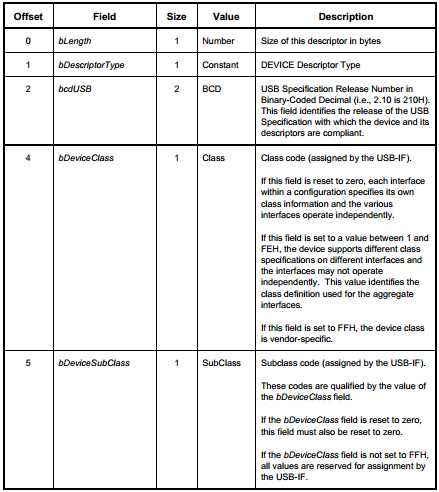
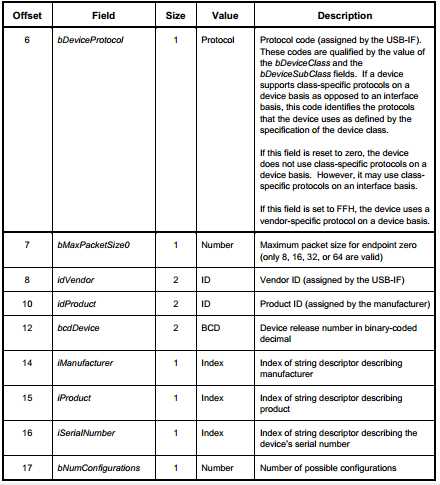
会发现USBH_DevDescTypeDef DevDesc就是上面的表格
typedef struct _DeviceDescriptor { uint8_t bLength; uint8_t bDescriptorType; uint16_t bcdUSB; /* USB Specification Number which device complies too */ uint8_t bDeviceClass; uint8_t bDeviceSubClass; uint8_t bDeviceProtocol; /* If equal to Zero, each interface specifies its own class code if equal to 0xFF, the class code is vendor specified. Otherwise field is valid Class Code.*/ uint8_t bMaxPacketSize; uint16_t idVendor; /* Vendor ID (Assigned by USB Org) */ uint16_t idProduct; /* Product ID (Assigned by Manufacturer) */ uint16_t bcdDevice; /* Device Release Number */ uint8_t iManufacturer; /* Index of Manufacturer String Descriptor */ uint8_t iProduct; /* Index of Product String Descriptor */ uint8_t iSerialNumber; /* Index of Serial Number String Descriptor */ uint8_t bNumConfigurations; /* Number of Possible Configurations */ } USBH_DevDescTypeDef;
在看 USBH_CfgDescTypeDef CfgDesc;之前我们看看
Table 9-10. Standard Configuration Descriptor
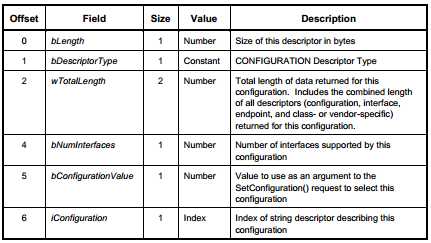
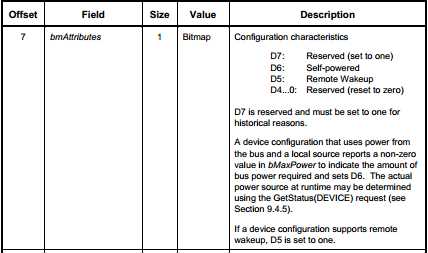
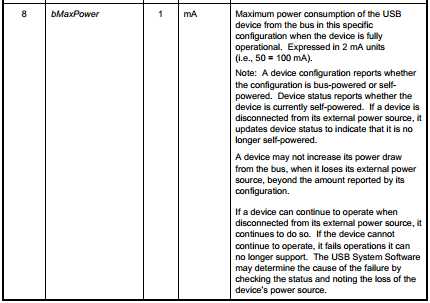
但是我们USBH_CfgDescTypeDef CfgDesc中多了USBH_InterfaceDescTypeDef Itf_Desc[USBH_MAX_NUM_INTERFACES]
typedef struct _ConfigurationDescriptor
{
uint8_t bLength;
uint8_t bDescriptorType;
uint16_t wTotalLength; /* Total Length of Data Returned */
uint8_t bNumInterfaces; /* Number of Interfaces */
uint8_t bConfigurationValue; /* Value to use as an argument to select this configuration*/
uint8_t iConfiguration; /*Index of String Descriptor Describing this configuration */
uint8_t bmAttributes; /* D7 Bus Powered , D6 Self Powered, D5 Remote Wakeup , D4..0 Reserved (0)*/
uint8_t bMaxPower; /*Maximum Power Consumption */
USBH_InterfaceDescTypeDef Itf_Desc[USBH_MAX_NUM_INTERFACES];
}
USBH_CfgDescTypeDef;
我们继续翻书
Table 9-12. Standard Interface Descriptor
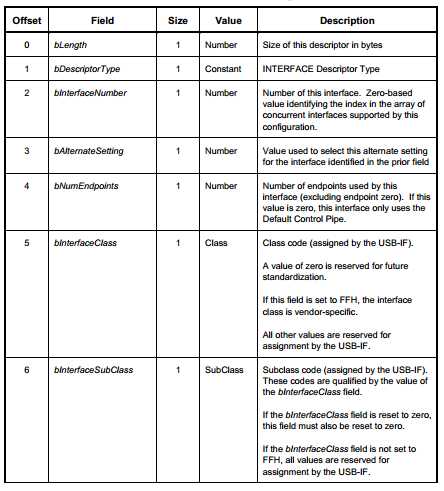
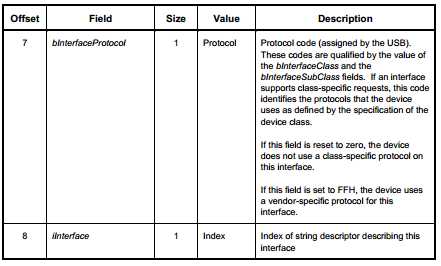
我们会发现USBH_InterfaceDescTypeDef中有多了 USBH_EpDescTypeDef Ep_Desc[USBH_MAX_NUM_ENDPOINTS];
typedef struct _InterfaceDescriptor { uint8_t bLength; uint8_t bDescriptorType; uint8_t bInterfaceNumber; uint8_t bAlternateSetting; /* Value used to select alternative setting */ uint8_t bNumEndpoints; /* Number of Endpoints used for this interface */ uint8_t bInterfaceClass; /* Class Code (Assigned by USB Org) */ uint8_t bInterfaceSubClass; /* Subclass Code (Assigned by USB Org) */ uint8_t bInterfaceProtocol; /* Protocol Code */ uint8_t iInterface; /* Index of String Descriptor Describing this interface */ USBH_EpDescTypeDef Ep_Desc[USBH_MAX_NUM_ENDPOINTS]; } USBH_InterfaceDescTypeDef;
还是老规则先翻书
Table 9-13. Standard Endpoint Descriptor
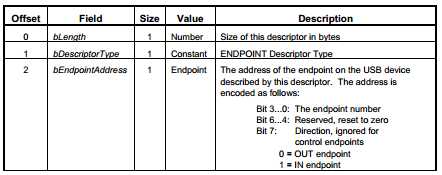
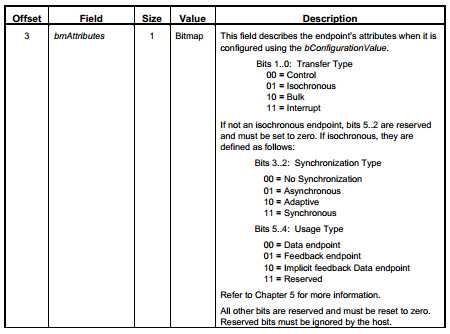
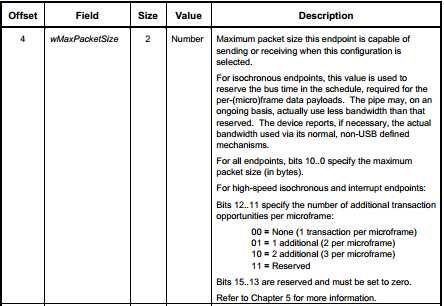
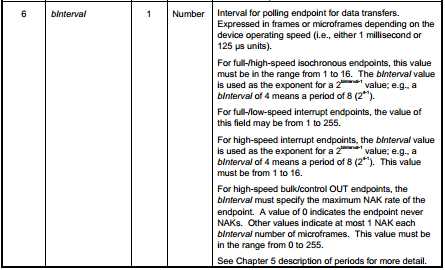
typedef struct _EndpointDescriptor { uint8_t bLength; uint8_t bDescriptorType; uint8_t bEndpointAddress; /* indicates what endpoint this descriptor is describing */ uint8_t bmAttributes; /* specifies the transfer type. */ uint16_t wMaxPacketSize; /* Maximum Packet Size this endpoint is capable of sending or receiving */ uint8_t bInterval; /* is used to specify the polling interval of certain transfers. */ } USBH_EpDescTypeDef;
其实上面的描述符
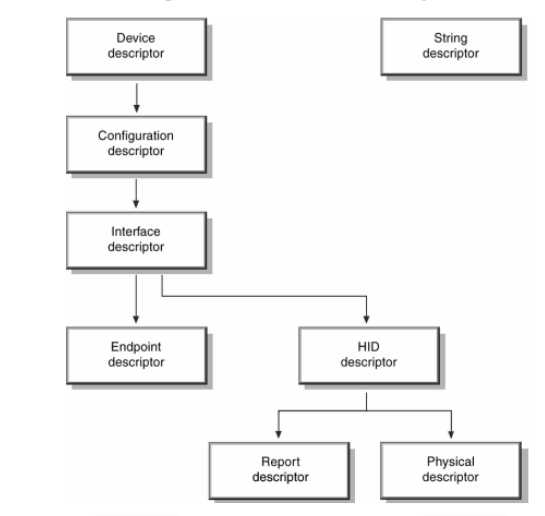
标签:title field mfc ini vendor with standard log error
原文地址:http://www.cnblogs.com/libra13179/p/7219891.html